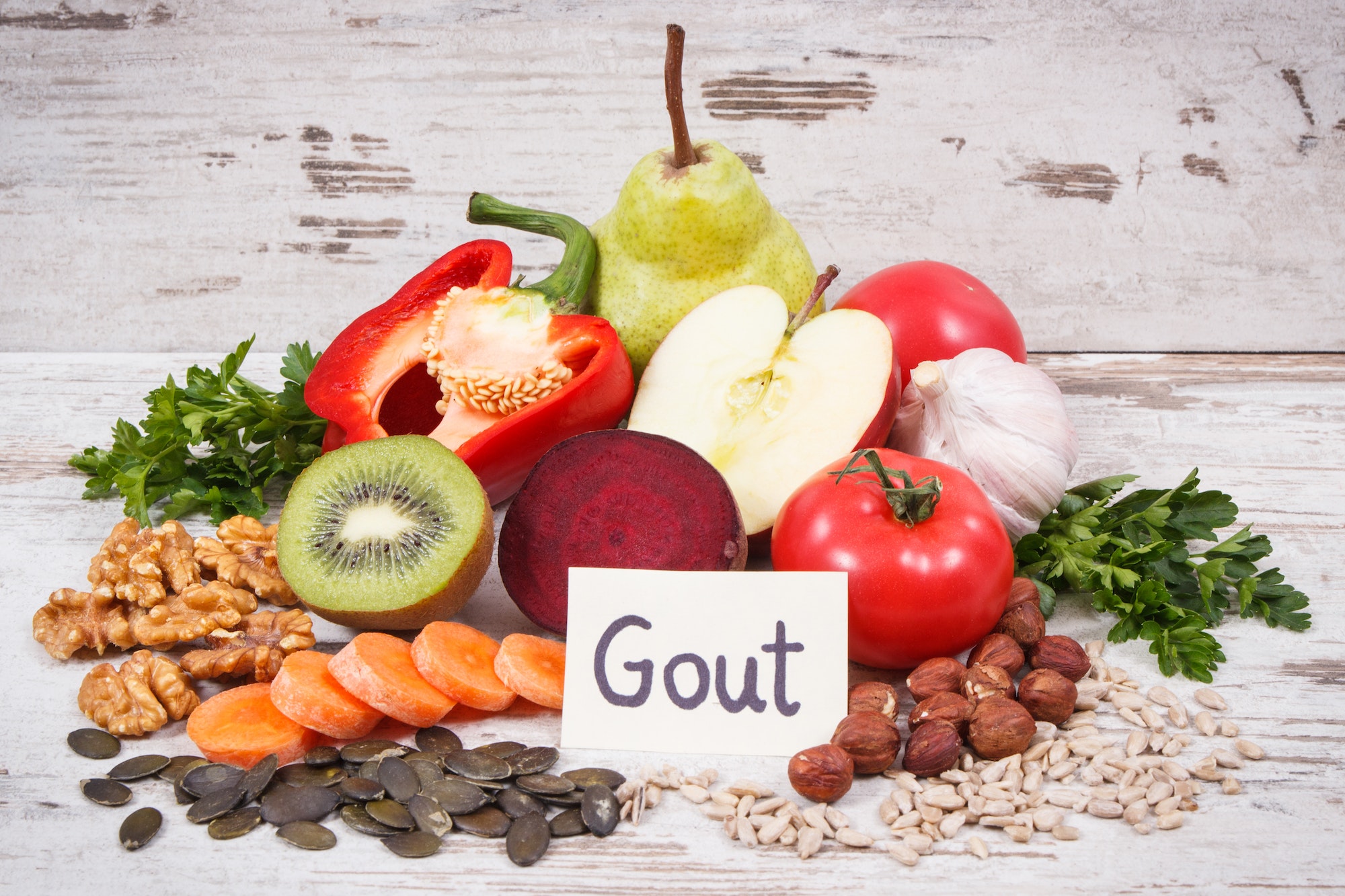If you’re looking for Uric Acid diet tips and ways to decrease uric acid naturally through dieting, you’ve come to the right place. High uric acid levels are a condition that can occur when there is too much uric acid in the blood.
Uric acid is a waste product made when the body breaks down purines found in many foods. Typically, the kidneys filter uric acid from the blood and excrete it in the urine. When the kidneys cannot remove enough uric acid from the blood, the level of uric acid in the blood rises, leading to health problems.
Did you know the foods you eat can directly impact uric acid levels? Dieting is one of your best options if you look for natural ways to lower uric acid. This post will discuss how to decrease uric acid through dieting and provide some tips for following a uric acid diet.
But first, let’s go over the basics of uric acid, its causes, and the conditions that come with it.
What is Gout?
When a person has too much uric acid in their body, it can form crystals in their joints, leading to gout, a type of arthritis that causes pain, swelling, and inflammation in the joints. Gout can be excruciating and cause swelling, redness, and stiffness in the affected area. While medication options are available to help manage gout symptoms, changing your diet is one of the best ways to decrease uric acid levels naturally.
There are many foods that are high in purines, so it can be challenging to know what to eat if you’re trying to lower your uric acid levels. However, there are some foods that are thought to help reduce uric acid levels. These include cherries, strawberries, and other dark-colored berries. These berries are thought to contain compounds that can help break down uric acid.
Another food that’s thought to help reduce uric acid levels is celery. Celery is high in vitamin C, which is thought to help break down uric acid. Celery is also a good source of fiber, which can help keep your digestive system healthy and may help reduce the risk of gout.
Many options are available if you’re looking for a uric acid diet to help lower your levels naturally. However, it’s essential to talk to your doctor before making any changes to your diet. Your doctor can help you determine the best way to lower uric acid levels and offer other treatments if necessary.
Causes of High Uric Acid
There are many potential causes of high uric acid levels, including:
- Kidney problems that prevent the kidney from filtering uric acid from the blood
- Certain medical conditions such as leukemia and psoriasis
- Certain medications such as diuretics (water pills) and salicylates (aspirin)
- Alcohol abuse
- Crash diets or fasting
Symptoms & Signs of Uric Acid
Most people with high uric acid levels do not have any symptoms. When symptoms do occur, they can include:
- Joint pain or swelling, especially in the toe
- Red, hot, and tender joints
- Difficulty moving the affected joint
- Body aches and fatigue
- Fever
If not treated, high uric acid levels can lead to more severe problems such as kidney stones and gout. as mentioned earlier, gout is a type of arthritis that causes sudden attacks of severe pain, swelling, redness, and warmth in the joints. Left untreated, gout can also cause damage to the joints, tendons, and other tissues.
Kidney stones are hard deposits that form in the kidneys. They can cause pain, blood in the urine, and other problems. If you have any of these symptoms, see your doctor right away. He or she can do tests to determine if you have high uric acid levels and help you create a treatment plan.
Lifestyle Tips To Reduce Uric Acid
 Cutting back on foods that are high in purines is an excellent place to start with controlling your uric acid levels. Organ meats (kalayji) and seafood are all high in purines and should be limited if you’re trying to decrease uric acid levels.
Cutting back on foods that are high in purines is an excellent place to start with controlling your uric acid levels. Organ meats (kalayji) and seafood are all high in purines and should be limited if you’re trying to decrease uric acid levels.
You should also avoid processed or high-fat foods.
Increasing your water intake is another simple way to help decrease uric acid levels. Water helps to flush out toxins and helps to keep your body hydrated, which is essential for overall health. Try to drink eight glasses of water a day, and more if you’re active or sweating.
Finally, getting regular exercise is another excellent way to decrease uric acid levels. Exercise helps to increase circulation and helps to flush out toxins from your body. It also helps to reduce stress, which can trigger gout flare-ups. Aim for at least 30 minutes of moderate exercise every day.
Making these simple lifestyle changes can help you decrease uric acid levels naturally and help to prevent gout flare-ups. Talk to your doctor about medication options if you’re struggling to control your uric acid levels with diet and lifestyle changes alone.
Uric Acid Diet Menu – Tips for High Uric Acid Patients
If you suffer from high uric acid levels, it is essential to maintain a healthy diet. Certain foods can help lower uric acid levels, which should be included in your diet.
Uric Acid Diet Chart – Best Foods For Reducing High Uric Acid
Cherries
These little red fruits are packed with antioxidants, which can help to reduce inflammation and pain caused by high uric acid levels. Eat a handful of fresh cherries every day, or drink cherry juice.
Celery (Ajwain)
This crunchy vegetable is rich in vitamins and minerals, including potassium, which helps to neutralize excess acid in the body. Include celery in your salads, or eat it as a snack with some peanut butter.
Strawberries
These delicious berries are also rich in antioxidants and vitamin C, which can help reduce inflammation and pain. Eat a few strawberries daily, or add them to your morning smoothie.
Salmon
This fatty fish is packed with omega-3 fatty acids, which have anti-inflammatory properties. Eat salmon at least twice a week to enjoy the benefits.
Yogurt
This probiotic food helps improve gut health, benefiting those with high uric acid levels. Choose plain yogurt and add some fresh fruit for a healthy snack or breakfast option.
Green tea
This antioxidant-rich beverage can help to reduce inflammation and pain associated with high uric acid levels. Drink green tea regularly throughout the day.
High Uric Acid Foods to Avoid
In addition to including these foods in your diet, avoiding foods that can trigger or worsen symptoms of high uric acid is also essential. These include.
Sugary Drinks
Sodas, fruit juices, and other sweetened beverages can increase uric acid levels. Choose water or unsweetened tea instead.
Red Meat
Overeating red meat can also trigger symptoms of high uric acid. Limit your intake of beef and mutton.
Processed foods
Foods that are high in sodium and saturated fat can also trigger symptoms. Avoid processed meats, cheeses, and packaged snacks.
Refined Carbs
White bread, pasta, and other refined carbohydrates can also increase uric acid levels. Choose whole grain options instead.
Following a healthy diet is vital in managing your condition if you suffer from high uric acid levels. Include foods that help to lower uric acid levels, and avoid those that can trigger or worsen symptoms. Doing so can help you to feel your best and enjoy a more symptom-free life.
While medications are available to help decrease uric acid levels, many people are looking for natural remedies. The uric acid diet is a great way to decrease your uric acid levels naturally. This diet is based on the principle that you should eat foods that lower uric acid and avoid foods that increase it.
So, these are some of the main points you should keep in mind if you have high uric acid while following a proper diet. The most crucial part is strictly avoiding high uric acid foods and following a healthy and balanced diet.
Make sure to drink plenty of fluids in any form, and consult your doctor if you have any questions or concerns. Remember, it is always better to be safe than sorry about your health!
We’ve provided a Pakistani menu of dietary tips for the uric acid diet as an example. If you’re interested in starting this diet, be sure to speak with your doctor first to make sure it’s right for you.
And if you have any questions about the diet or how to follow it, please let us know in the comments below.

